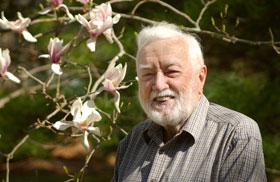  |
| HOME | THIS ISSUE | CALENDAR | GRANTS | BACK ISSUES | < BACK | NEXT > |
Former dean of Medical School, Dr. John Patterson, dies at 89
by Pat Keefe - May 15, 2006
|
||||
|
Dr. John W. Patterson, the UConn Health Center’s first executive director and second dean of the School of Medicine, died May 9. He was 89. Patterson was one of two planning associates for UConn’s new medical school in 1963. He was named dean when Dr. Lyman Stowe died unexpectedly in 1965, and was named Health Center executive director in 1970. Patterson played an important role in North American medical education in the 20th century. In addition to his pivotal role in establishing the Health Center, he had formative leadership responsibilities in the medical programs at Western Reserve University, now Case-Western Reserve University; Vanderbilt University; and the University of British Columbia. In 1952 and 1953, he was co-ordinator of Phase I for the new medical program at Western Reserve, before being named associate dean of medical education. He then migrated to Canada to become dean of the medical school at the University of British Columbia for two years, returning to the United States in 1958 to become dean of Vanderbilt’s medical school. There, he was also director of medical affairs, and was later named vice chancellor for medical affairs. Patterson was a staunch proponent of an interdisciplinary approach to medical education, an approach he found “works uncommonly well.” Students like it, he said, and departments share more and compete less. He was born in Baldwin, Kan., in 1916. His father was an immigrant from Northern Ireland who, once in America, graduated from high school, college, and divinity school and moved his family to a mission in India. As a child, John Patterson was educated with the children of British civil servants in India, yet to him the low caste Indian boys attending his father’s school in Kodai “were like family.” As a youth he swam the Bosphorus Strait, the fabled strip of water between Istanbul and the rest of Turkey that separates Europe and Asia. He earned an A.B. and a D.Sc. from Ohio Wesleyan University; an M.S. and Ph.D. from Ohio State University; and an M.D. degree from Western Reserve University. In 1975, he resigned as the UConn Health Center’s dean and executive director to take up teaching and research duties as a professor of physiology. In the lab he distinguished himself as he had as a medical educator, specializing in the physiology of the lens of the eye and galactosemia, a flaw in sugar metabolism that can result in cataracts.
That work also had implications for diabetes. His work was funded with an initial grant from the Florence Mattern Solomon Fund for Eye Disease. That grant later became the basis of the John A. and Florence Mattern Solomon Chair in Vision Biology and Eye Diseases. (The chair is currently held by Dr. David S. Papermaster.) In 1975, a day in honor of John W. Patterson was held at the Health Center. The day featured a scientific symposium with experts from around the country addressing his subject – intermediary metabolism and its implications for clinical medicine. During the evening, speakers included former Gov. John Dempsey; former UConn President Homer Babbidge; former School of Dental Medicine Dean Lewis Fox; then-UConn President Glenn Ferguson; Dr. Robert Massey, Dr. Patterson’s successor as dean and acting executive director; and Dr. Irwin Lepow of the Department of Medicine. In 1979, Patterson was named University Professor, UConn’s highest designation for faculty at the time. In 1988, the Health Center erected a bronze plaque in the Academic Entrance honoring Patterson for his numerous accomplishments; and four years later, the Green Auditorium, one of two main educational auditoria, was renamed the Patterson Auditorium. Patterson once said, “I like to stew about things for a while. Stewing produces better answers and – in addition to decisions – better policy. “I have learned you cannot do it all by yourself,” he said. “Other people have talents, time, drive, and a desire to contribute and achieve. What you get in the end is better if you get it through cooperation.” Patterson retired in 1993.
|
| ADVANCE HOME UCONN HOME |

